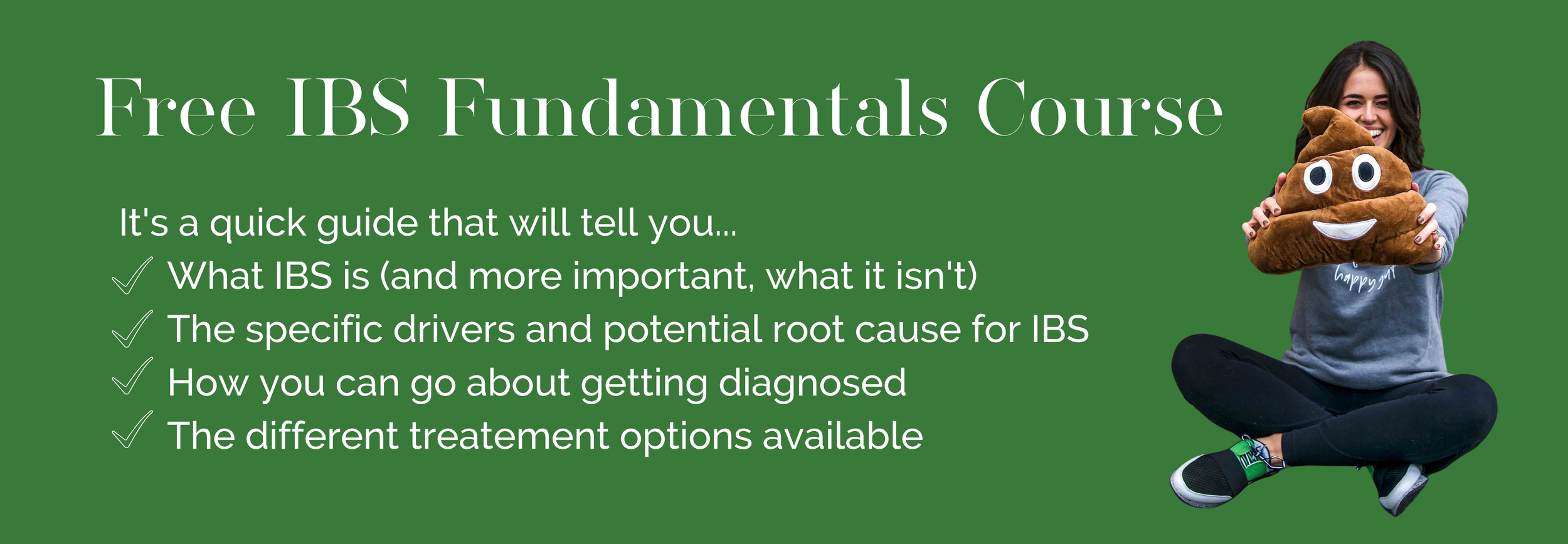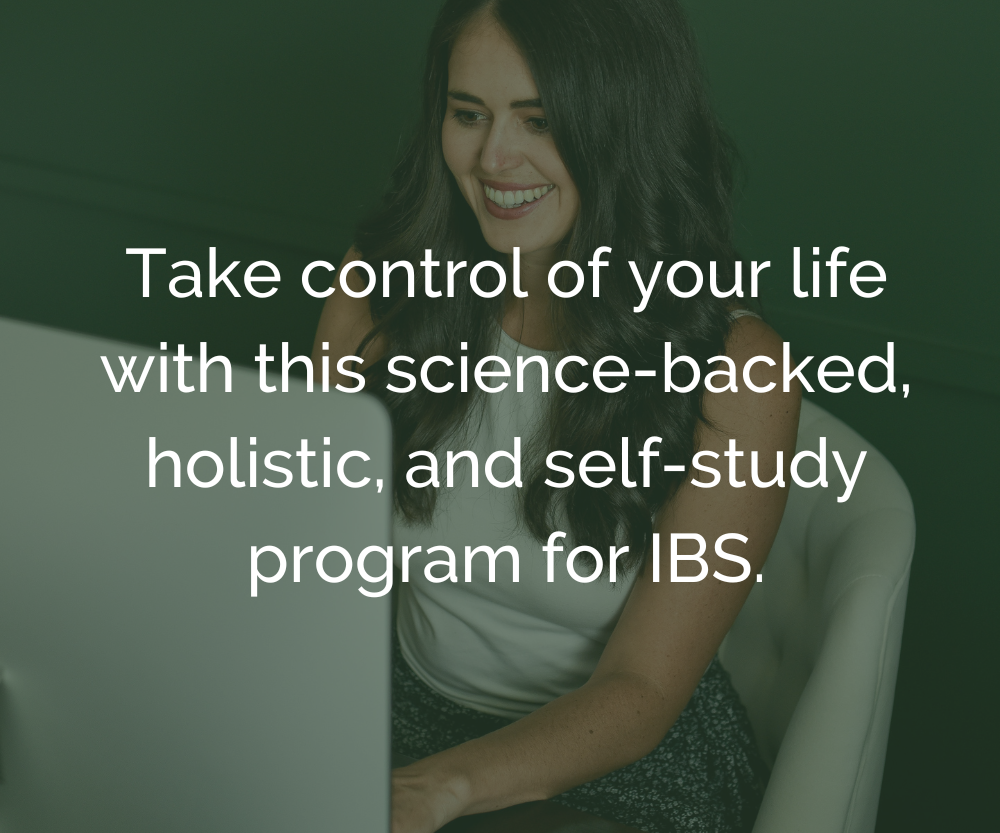How To Diagnose IBS
Irritable bowel syndrome (IBS) affects around 10-15% of the population. If you’ve struggled with digestive issues and stomach upset, then there’s a chance IBS could be the culprit. If that’s what led you here, know that the first step to this suspicion is to get an accurate diagnosis. It may take some time and you may have to work with several doctors in the process, but the process itself is so important because it rules out other conditions that can overlap with and mask as IBS. Some of these conditions can have a serious impact on your health, as well as require specialized treatment.
The goal of this blog is to break down the steps to getting a diagnosis as efficiently as possible, so that you can get answers and start getting to the bottom of your symptoms quickly.
Remember, this is not your guide to self-diagnosis. This is simply information to help you as you find the right doctor to go through the process with.
Symptoms to Look For
Before we dive into the process of diagnosing IBS, it’s important to break down the warning signs of this disorder. IBS is a functional gut-brain disorder that affects the large intestine. It is most known for its symptoms of altered gut motility (constipation and/or diarrhea), abdominal pain, and other gastrointestinal (GI) symptoms like bloating and gas.
With IBS, the changes in motility will be more chronic, meaning they are present over a longer period of time. These changes could come and go in short bouts or they could be present every day. The key is that they recur over a longer period of time.
The changes in gut motility, or the speed of the gut, can present as constipation, diarrhea, or a combination of both. Many with IBS will report having these changes for a large portion of their lives, without realizing that there was something wrong. Typically, a drastic change in these symptoms will send them to the doctor to then find out it is IBS. It is not uncommon for the motility changes to change over time.
Another key marker of IBS is pain due to visceral hypersensitivity, which is heightened pain due to changes in the intestines, like the stretching of the gut with an increase in gas. This can explain why those with IBS experience high levels of pain linked to symptoms of gas and bloat that others may not understand. Many with IBS will report missing work or cancelling plans frequently due to this pain.
What’s your poop personality? Find out here!
Keep a Journal
If you suspect that you have some of these symptoms and you are looking to get answers, the first step would be to keep a detailed journal of what’s going on. A journal helps you piece together correlations, track the presence and severity of symptoms, and communicate what you’re experiencing with your doctor.
When keeping a journal, the key pieces you want to include are any and all symptoms, food, stress, medications and supplements, and your menstrual cycle (if applicable). All of these pieces will give you a big picture of what’s happening and will also help your healthcare team provide the best guidance for you.
My Gut Journal is a great resource for this and is designed to provide clear data to your healthcare team, as well as guide you in reflecting over your own data so you can learn more about your body.
See a Gastroenterologist
A gastroenterologist specializes in conditions that affect the gut, including IBS. Primary care doctors will often diagnose IBS based on certain criteria, but it is best to confirm with a gastroenterologist so that they are looking for other conditions that may overlap with or mask as IBS, including inflammatory bowel disease (IBD), celiac disease, colon cancer, gastroparesis, bacterial infections, and others. Check with your insurance to see if you can go straight to a gastroenterologist or if you need a referral from your primary care doctor.
Doctor’s appointments can be overwhelming due to the limited time you may have with the doctor. One way to get the most out of your time with them is to prepare in advance. Take time to organize what you’ve experienced, including the timeline of when symptoms began and how they have changed or progressed over time. Write this down so that you can present it clearly. You can also take your journal and present the information to the doctor to review.
Talking about bowel habits and issues can be uncomfortable for many, which can lead to under sharing the severity of the symptoms they have. It will take a bit of courage, but if you can share all of the details of your symptoms, you may be more likely to get the right tests and diagnosis.
Remember that it’s okay to ask questions. If the doctor chooses to prescribe a medication, recommends a diet, and/or orders a test, ask why. If you feel confused, it’s okay to ask for clarification so that you are part of your own healthcare team. If time doesn’t allow, ask for a contact that you can send your questions to so that you are fully informed of your care plan.
If the doctor does recommend making specific changes, it’s also a great idea to ask for referrals for guidance so that you are not left to make those changes alone, especially if they are for diet. Dietitians are trained to help guide you through these changes, so ask for a referral to a dietitian that specializes in IBS and digestive disorders to help you.
Common tests for IBS
Once you’ve had an initial conversation with your doctor, they may start ordering tests to figure out what is going on. Typically, doctors will start with fewer, less expensive tests, then will move on to more invasive testing if there are signs of other conditions or symptoms are not improving. Here are some of the most common tests that are used. Note that your doctor may choose to do some of these, but may not need to do all of them.
Bloodwork: this is typically the first step doctors will take as it is non-invasive and less expensive. There are no markers in the blood currently that will confirm IBS, but they will look for markers that could show signs of other conditions. Typically, they are looking for anemia, B12 deficiency, antibodies that show signs for celiac disease, and inflammation markers including C-reactive protein (CRP) and erythrocyte sedimentation rate (ESR).
Stool test: this is also fairly non-invasive and can be used to detect infections like h.pylori and c-diff, parasites, and elevated calprotectin (marker for IBD).
Colonic transit test: this is used to see how quickly something moves through the large intestine and may be used to detect causes for constipation or diarrhea.
Endoscopy: this is a procedure that places a camera through the throat in order to look at the esophagus, stomach, and small intestine. This can be used to detect reflux, ulcers, cancers, inflammation, celiac, blockages, gastritis, and other issues of the stomach and proximal small intestine.
Capsule endoscopy: this is a procedure where one swallows a capsule that contains a wireless camera to take pictures as it passes through the small intestine. This can be used to find a cause of GI bleeds, detect IBD, detect cancer, detect celiac disease, look for abnormalities in the esophagus, and screen for polyps.
Colonoscopy: this is a procedure that uses a scope to look at the large intestine (colon) and the rectum to look for celiac disease, IBD, damage, and cancer. Biopsies may be taken from the gut in order to test the tissue for specific markers.
Gastric emptying scintigraphy (GES): test done to determine how quickly food leaves the stomach. This can be used to detect gastroparesis.
Lactulose/glucose breath test: this is used to measure gas produced by bacteria in the gut to detect small intestinal bacterial overgrowth (SIBO).
Hydrogen breath test: this is used to measure gas production in order to detect lactase deficiency and lactose intolerance.
Anorectal manometry: this test measures the function of the muscles and nerves of the anus and rectum to indicate pelvic floor dysfunction.
Diagnosis
After testing has been done to rule out other conditions, diagnosis can be made according to Rome IV criteria. Since IBS is a functional disorder, then there won’t be a specific diagnostic marker found through testing. Instead, the criteria are used to identify the symptoms that characterize IBS for the diagnosis. Due to this, IBS can often be diagnosed quickly and other conditions can be missed. This is why it’s so important to stay connected with your doctor and make sure other conditions are ruled out.
The Rome IV Criteria for IBS (the information below has been taken directly from the Rome Foundation, sourced below)
Recurrent abdominal pain on average at least 1 day/week in the last 3 months, associated with 2 or more of the following criteria:
Related to defecation (aka pooping)
Associated with a change in frequency of stool
Associated with a change in form (appearance) of stool
Criteria fulfilled for the last 3 months with symptom onset at least 6 months prior to diagnosis.
Source: https://theromefoundation.org/rome-iv/rome-iv-criteria/
After diagnosis
Once you have a diagnosis of IBS, your doctor will likely recommend a treatment plan. There is currently no set treatment protocol or cure for IBS, so the treatment options will vary depending on your doctor, your symptoms, and your preferences.
Some options you can ask about and consider:
Medications: while this may not be a long term solution, there are many medications that can help with the management of symptoms. It’s best to discuss these options with your doctor, along with side effects, so that you can make the best decision.
Supplements: there are also a variety of supplements that can be used to manage symptoms. This can be discussed with your doctor, as well as a dietitian to determine what would be the best option for you.
Nutrition counseling: working with a Registered Dietitian on diet and lifestyle strategies to manage symptoms is highly effective. It’s best to find a dietitian who specializes in IBS and digestive disorders to get the best care. This is what we do in our 1:1 program and MASTER Method group program.
Pelvic floor physical therapy: if there are signs of pelvic floor dysfunction, a pelvic floor physical therapist can help with training the muscles to function properly, internal work to break up scar tissue and relax the muscles, and exercises to help support the gut during digestion.
Gut-directed hypnotherapy: a form of hypnosis that aims to calm the digestive tract and take the focus away from the body (and symptoms) to relax the mind. This practice targets the miscommunication between the gut and brain that we see with IBS, and is used by trained therapists for IBS treatment.
Cognitive behavioral therapy: a form of psychotherapy that can help modify thoughts and behaviors for improved symptoms due to stress and anxiety.
I hope this blog was helpful for you to figure out what your next steps may be. If you did find it helpful, share it with a friend who could also benefit from this information! If you’d like more information on IBS, sign up for our free IBS Fundamentals Course here!
Are you frustrated with your IBS symptoms? Do you desire to be confident in your food choices? Do you want to have a healthier relationship with your body and diet? Are you ready to take control of your IBS?



